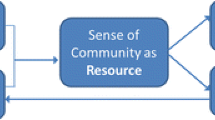Conclusion
The ecological principle of interdependence has been a guiding theme in our research and conceptualization. For the development of community psychology, academic and applied interest and networks must be integrated in ways which value the views and resources of both groups. This is the focus of Kelly's (1984) remarks. The dynamic interplay of ideas, data, and practices is likely to facilitate the collaboration between researchers and setting inhabitants which Trickett (1984) describes as the distinctive quality of community psychology. Common pathways of information exchange, joint responsibility for training future members of the field, and mutually enhancing role relationships are needed. Current channels of communication provide little ease of access or incentives for participation by psychologists in nonacademic settings. It thus becomes the reponsibility of all concerned community psychologists to use their organizational skills to redress this harmful imbalance (Kelly, 1984). For this to occur, however, we must take the initial steps of frankly recognizing differences in our folkways and organizational constraints, while also emphasizing our common values and assets. The largest threat to the field is external constraints from university and clinical service settings on the work that represents community psychology (Elias et al., 1984). If we are dividedor uninformed in the face of these environmental presses, we will never create the adaptive niche that community psychology needs to survive.
Similar content being viewed by others
References
Dalton, J. H., Elias, M. J., & Howe, G. W. (1985). Studying the research community in community psychology: A network analysis. In E. Susskind & D. Klein (Eds.),Research in community psychology (pp. 106–138). New York: Praeger.
Dorr, D. (1984). Observations by a “nonacademic” community psychologist.American Journal of Community Psychology, 12; 303–306.
Elias, M. J., Dalton, J. H., Franco, R., & Howe, G. W. (1984). Academic and nonacademic community psychologists: An analysis of divergence in settings, roles and values.American Journal of Community Psychology, 12, 281–302.
Elias, M. J., Dalton, J. H., & Howe, G. W. (1981). Studying community psychology as a community of professionals: An empirical approach.Professional Psychology, 12, 363–376.
Hagstrom, W. O. (1965).The scientific community. New York: Basic Books.
Heller, K., & Takemoto, M. A. (1984). Academic-practice divergence in community psychology.American Journal of Community Psychology, 12, 307–312.
Kelly, J. G. (1984). Interpersonal and organizational resources for the continued development of community psychology.American Journal of Community Psychology, 12, 313–317.
Kuhn, T. S. (1970).The structure of scientific revolutions (2nd. ed.). Chicago: University of Chicago Press.
Parker, W., & Paisley, W. (1966). Research of psychologists at the interface of the scientist and his information system.American Psychologist, 21, 1061–1071.
Price, R. (1983). The education of a prevention psychologist. In R. Felner, L. Jason, J. Moritsugu, & S. Farber (Eds.),Preventive psychology: Theory, research, and practice (pp. 290–296). New York: Pergamon Press.
Trickett, E. (1984). Toward a distinctive community psychology: An ecological metaphor for the conduct of community research and the nature of training.American Journal of Community Psychology, 12, 261–280.
Author information
Authors and Affiliations
Additional information
Helpful comments were received from James Kelly and Gary Cherniss. The assistance of Annette Martini and Marion Savoca in the preparation of this manuscript is gratefully acknowledged.
Rights and permissions
About this article
Cite this article
Elias, M.J., Dalton, J.H., Franco, R. et al. Divergence between community psychologists in academic and nonacademic settings: A closer look at the implications. Am J Commun Psychol 14, 113–118 (1986). https://doi.org/10.1007/BF00923253
Issue Date:
DOI: https://doi.org/10.1007/BF00923253




